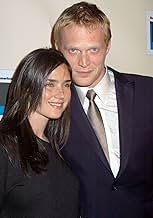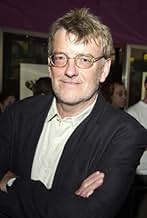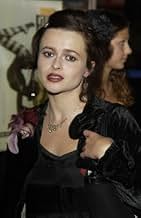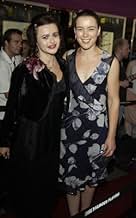AVALIAÇÃO DA IMDb
6,5/10
2,8 mil
SUA AVALIAÇÃO
Adicionar um enredo no seu idioma1930's London. Two sisters - Madeleine and Dinah - One marries Rickie, the other falls in love with him. He begins an affair which is to have repercussions throughout their lives.1930's London. Two sisters - Madeleine and Dinah - One marries Rickie, the other falls in love with him. He begins an affair which is to have repercussions throughout their lives.1930's London. Two sisters - Madeleine and Dinah - One marries Rickie, the other falls in love with him. He begins an affair which is to have repercussions throughout their lives.
- Direção
- Roteiristas
- Artistas
- Prêmios
- 3 vitórias e 1 indicação no total
- Direção
- Roteiristas
- Elenco e equipe completos
- Produção, bilheteria e muito mais no IMDbPro
Avaliações em destaque
This exquisitely crafted film is much better than what we have heard it was. The film has an incredible texture, but of course, it's not for everyone. Director Thaddeus O'Sullivan presents this story of love and betrayal with a style that is surprising. The material in which this film is based is the novel by Rosamond Lehmann, that shows a slice of the life in London among the upper classes in the 30s, prior to WWII and adapted for the screen by Lucinda Coxon.
The story of this love triangle involves Madeleine, a young society matron, married to Rickie, a successful bank executive. They entertain lavishly; it's obvious they know the right people, as it shows in their lavish parties. Dinah, Madeleine's sister is a loose cannon. She is a young woman who couldn't care less about being int the right places, or to mix with the right crowd.
Dinah and Rickie begin an affair. Rickie agonizes about the situation and how to handle it. Madeleine never gets a hint until Rickie reveals his intention of leaving her. Madeleine, without Rickie will lose it all, her status in society and all the other little perks. But she is not prepared to accept the idea that Dinah is the one who has lured Rickie away from her. The relationship among the three principals will never be the same.
Helena Bonham Carter plays Dinah with abandon. She's a no nonsense actress and she clearly gets into her character's skin. Olivia Williams is a staid and shocked Madeleine. Ms Williams is a beauty that epitomizes the type of English society woman naturally. Paul Bettany is convincing as Rickie, the man torn between love and duty. Eleanor Bron makes an excellent Mrs. Burkett.
The story of this love triangle involves Madeleine, a young society matron, married to Rickie, a successful bank executive. They entertain lavishly; it's obvious they know the right people, as it shows in their lavish parties. Dinah, Madeleine's sister is a loose cannon. She is a young woman who couldn't care less about being int the right places, or to mix with the right crowd.
Dinah and Rickie begin an affair. Rickie agonizes about the situation and how to handle it. Madeleine never gets a hint until Rickie reveals his intention of leaving her. Madeleine, without Rickie will lose it all, her status in society and all the other little perks. But she is not prepared to accept the idea that Dinah is the one who has lured Rickie away from her. The relationship among the three principals will never be the same.
Helena Bonham Carter plays Dinah with abandon. She's a no nonsense actress and she clearly gets into her character's skin. Olivia Williams is a staid and shocked Madeleine. Ms Williams is a beauty that epitomizes the type of English society woman naturally. Paul Bettany is convincing as Rickie, the man torn between love and duty. Eleanor Bron makes an excellent Mrs. Burkett.
I've heard that Western religious dogma eschews the thought never mind the act of a man lusting for his neighbor's wife. What really rocks the boat is a married man sappily and hopelessly enmeshed in the arms of his wife's sister. And that's what we have in this dark hued English drama whose scenes alternate between the pre-war social frivolity of affluent men and women unaware that their time was almost up and postwar scenes tieing the story together.
Helena Bonham Carter is Dinah, a free spirit given to studying, and perhaps evangelizing, the gospel of malcontents and revolutionaries in that nonthreatening and oddly endearing manner that insures both bemusement and acceptance by well-to-do English gentlefolk. Olivia Williams is her married sister, Madeleine, a hostess with the mostess, married to businessman Rickie, played by Paul Bettany.
The focus of the film is on this trio, not a menage a trois but a coruscating set of characters wracked by love, lust and confusion leavened by sporadic betrayal and reconciliation.
It's really simple: Rickie sort of loves or at least very much likes Madeleine but his heart and other body parts desperately seek and need Dinah. Dinah loves her sister and her charming adolescent son but she must have Rickie. Madeleine loves both but is blind to the reality of their relationship until... A story of this genre must have a clear and unambiguous "until."
Directed by Thaddeus O'Sullivan, the acting of the three principals is, simply, mesmerizingly superb. Helena Bonham Carter is renowned for her period pieces (she can do much more and she does) and she fits into London's prewar world and its gray aftermath as if she actually experienced those times. Paul Bettany captures the lost male guided by his...ah, lust, with but minimal if any moral insight into his conduct. Special mention must be made of Olivia Williams who captures the pathos, hope and desperation of a decent woman swept up by acts of betrayal she never envisaged as possible. I hope we see much more of this fine actress.
The score by Nicholas Hooper is very good but judicious editing was needed to reduce intrusiveness of the music and the sound level ought to have been lowered for a number of scenes.
A fine production.
8/10.
Helena Bonham Carter is Dinah, a free spirit given to studying, and perhaps evangelizing, the gospel of malcontents and revolutionaries in that nonthreatening and oddly endearing manner that insures both bemusement and acceptance by well-to-do English gentlefolk. Olivia Williams is her married sister, Madeleine, a hostess with the mostess, married to businessman Rickie, played by Paul Bettany.
The focus of the film is on this trio, not a menage a trois but a coruscating set of characters wracked by love, lust and confusion leavened by sporadic betrayal and reconciliation.
It's really simple: Rickie sort of loves or at least very much likes Madeleine but his heart and other body parts desperately seek and need Dinah. Dinah loves her sister and her charming adolescent son but she must have Rickie. Madeleine loves both but is blind to the reality of their relationship until... A story of this genre must have a clear and unambiguous "until."
Directed by Thaddeus O'Sullivan, the acting of the three principals is, simply, mesmerizingly superb. Helena Bonham Carter is renowned for her period pieces (she can do much more and she does) and she fits into London's prewar world and its gray aftermath as if she actually experienced those times. Paul Bettany captures the lost male guided by his...ah, lust, with but minimal if any moral insight into his conduct. Special mention must be made of Olivia Williams who captures the pathos, hope and desperation of a decent woman swept up by acts of betrayal she never envisaged as possible. I hope we see much more of this fine actress.
The score by Nicholas Hooper is very good but judicious editing was needed to reduce intrusiveness of the music and the sound level ought to have been lowered for a number of scenes.
A fine production.
8/10.
`The Heart of Me' is pure, unadulterated soap opera redeemed by the kind of high-toned, stiff-upper-lip seriousness of which the British seem uniquely capable. Set primarily in the 1930's, the film tells the story of two sisters caught in a passionate and quasi-incestuous love triangle. Madeline (Olivia Williams), the older of the two, is an uptight woman whose weak-willed husband, Rickie (Paul Bettany), falls in love with her younger and more free-spirited sibling, Dinah (Helena Bonham Carter). These two in-laws, soul mates for life, carry on a torrid love affair until Madeline discovers the truth and even for a time thereafter.
Given the material, `The Heart of Me' could easily have devolved into a cheap, sensationalistic melodrama for the `Masterpiece Theatre' set. Instead, thanks to truly brilliant performances by the three principal actors and an intelligent, thoughtful screenplay, the film becomes a wholly absorbing drama that offers profound insights into the realities of the human heart. The pain each of these people experiences is so palpable in its intensity that it washes away all traces of artificiality and contrivance. The film becomes a fascinating study of what happens when clanging passions are hemmed in by the restrictions and proprieties of a strict, morally repressive upper class society. Rickie and Dinah choose to turn themselves into social pariahs, then must face the consequences of their convention-defying actions. Of most interest is the emotionally complex relationship between the two very different sisters. What makes the film special is the way in which it allows the seemingly cold-hearted Madeline to become as much a sympathetic figure as the two impassioned lovers. Thanks to Williams' impeccable performance (she played Penelope in the TV movie version of `The Odyssey'), Madeline is allowed to live and breathe and have her own say, making her, in many ways, the most intriguing of the three main characters.
`The Heart of Me,' which is beautifully detailed in costumes and settings, transcends the limits of its genre to deliver a heartbreaking tale of love, loss, lament - and hope.
Given the material, `The Heart of Me' could easily have devolved into a cheap, sensationalistic melodrama for the `Masterpiece Theatre' set. Instead, thanks to truly brilliant performances by the three principal actors and an intelligent, thoughtful screenplay, the film becomes a wholly absorbing drama that offers profound insights into the realities of the human heart. The pain each of these people experiences is so palpable in its intensity that it washes away all traces of artificiality and contrivance. The film becomes a fascinating study of what happens when clanging passions are hemmed in by the restrictions and proprieties of a strict, morally repressive upper class society. Rickie and Dinah choose to turn themselves into social pariahs, then must face the consequences of their convention-defying actions. Of most interest is the emotionally complex relationship between the two very different sisters. What makes the film special is the way in which it allows the seemingly cold-hearted Madeline to become as much a sympathetic figure as the two impassioned lovers. Thanks to Williams' impeccable performance (she played Penelope in the TV movie version of `The Odyssey'), Madeline is allowed to live and breathe and have her own say, making her, in many ways, the most intriguing of the three main characters.
`The Heart of Me,' which is beautifully detailed in costumes and settings, transcends the limits of its genre to deliver a heartbreaking tale of love, loss, lament - and hope.
Watchable but unsatisfying period piece, mistakenly listed on Amazon Prime as a current film; actually it's from 2002. Based on novelist Rosamond Lehmann's The Echoing Grove, which in turn was based on Lehmann's nine-year affair with poet Cecil Day-Lewis (father of Daniel). IRL Day-Lewis dumped both Lehmann and his wife and took up with actress Jill Balcon (mother of Daniel), which might've made a more interesting movie.
On-the-nose casting of Olivia Williams as the straitlaced, conventional sister and Helena Bonham-Carter as the unstable, bohemian sister ensures the best possible outcome for the creaky plot. Nice to see Elinor Bron (Dudley's Moore's unrequited crush in the original Bedazzled) again as the sisters' interfering mother. Paul Bettany does his best with the thankless role of the sisters' wavering husband/lover; the fact that he's so easily bamboozled by his mother-in-law suggests that Lehmann came away from all this with a poor opinion of C. Day-Lewis, which certainly seems understandable.
On-the-nose casting of Olivia Williams as the straitlaced, conventional sister and Helena Bonham-Carter as the unstable, bohemian sister ensures the best possible outcome for the creaky plot. Nice to see Elinor Bron (Dudley's Moore's unrequited crush in the original Bedazzled) again as the sisters' interfering mother. Paul Bettany does his best with the thankless role of the sisters' wavering husband/lover; the fact that he's so easily bamboozled by his mother-in-law suggests that Lehmann came away from all this with a poor opinion of C. Day-Lewis, which certainly seems understandable.
The soul of this film is in the empathy, or it would be easy to judge. Men tend to marry women who think like themselves, but there is that darker side, different from themselves, that some men cannot resist. In the usual case, at least as far as movie plots are concerned, his darker side will drive him to find some lover that is everything that he is not. If he is obsessive, she will be moody and impulsive, otherwise she will be the Eros to his Thanatos. The wife and the lover seldom know each other. In this case, however, he finds both of these women as sisters, adding incest to the convoluted plot. The one he marries is structured like himself, but then he falls in love, or lust, with the other, a neurotic Bohemian whose child-like passions rob him of reason.
There is a fatalistic element to this plot, however. All three characters, while seemingly driven by their feelings, are actually so out of touch with their feelings that they act without reason. We say that it is their "feelings" that are driving their actions, when in fact it is their lack of "reason" that is driving their actions. They are just letting themselves feel without thinking, as though it was "fate" that made such decisions. They can't help themselves. Fate has determined that he will marry the wrong sister, and fate has determined that he will become hopelessly obsessed by the other. What is left for the audience, therefore, is to empathize with their dilemma as presented, and agree without doubt that where matters of love are concerned, there is no room for reason.
What a pessimistic and lugubrious theme! Feelings, passions and emotions, are wonderful and inspiring forces, that can drive us to the heights of ambition, or drag us down to depression, bigotry and resentment. Unless measured by reason they are worthless and potentially harmful. It is "reason" that makes feelings supreme, not just feelings alone. Wallowing in passion without reason only results in self-indulgence and destruction, as evidenced by this film. The events of this story did not "just happen" to these characters as though by fate. Not only is there "room" for reason in matters where love is concerned, but without it love becomes a trap, a disease, and a tragedy. What is missing from this story is not love, but reason.
There is a fatalistic element to this plot, however. All three characters, while seemingly driven by their feelings, are actually so out of touch with their feelings that they act without reason. We say that it is their "feelings" that are driving their actions, when in fact it is their lack of "reason" that is driving their actions. They are just letting themselves feel without thinking, as though it was "fate" that made such decisions. They can't help themselves. Fate has determined that he will marry the wrong sister, and fate has determined that he will become hopelessly obsessed by the other. What is left for the audience, therefore, is to empathize with their dilemma as presented, and agree without doubt that where matters of love are concerned, there is no room for reason.
What a pessimistic and lugubrious theme! Feelings, passions and emotions, are wonderful and inspiring forces, that can drive us to the heights of ambition, or drag us down to depression, bigotry and resentment. Unless measured by reason they are worthless and potentially harmful. It is "reason" that makes feelings supreme, not just feelings alone. Wallowing in passion without reason only results in self-indulgence and destruction, as evidenced by this film. The events of this story did not "just happen" to these characters as though by fate. Not only is there "room" for reason in matters where love is concerned, but without it love becomes a trap, a disease, and a tragedy. What is missing from this story is not love, but reason.
Você sabia?
- CuriosidadesThe poem read by Dinah (Helena Bonham Carter) in the park is Broken Love, written by William Blake.
- Erros de gravaçãoTodas as entradas contêm spoilers
- Cenas durante ou pós-créditosThanks to the residents of Fitzroy Square.
- Trilhas sonorasThe Very Thought of You
Written by Ray Noble
Performed by Al Bowlly with Ray Noble and His Orchestra
Published by Campbell Connelly & Co., Ltd.
By arrangement with Past Perfect Vintage Music
Principais escolhas
Faça login para avaliar e ver a lista de recomendações personalizadas
- How long is The Heart of Me?Fornecido pela Alexa
Detalhes
Bilheteria
- Orçamento
- US$ 7.000.000 (estimativa)
- Faturamento bruto nos EUA e Canadá
- US$ 196.067
- Fim de semana de estreia nos EUA e Canadá
- US$ 21.956
- 15 de jun. de 2003
- Faturamento bruto mundial
- US$ 282.519
- Tempo de duração1 hora 36 minutos
- Cor
- Mixagem de som
- Proporção
- 1.85 : 1
Contribua para esta página
Sugerir uma alteração ou adicionar conteúdo ausente

Principal brecha
By what name was Meu Amor, Minha Perdição (2002) officially released in Canada in English?
Responda































